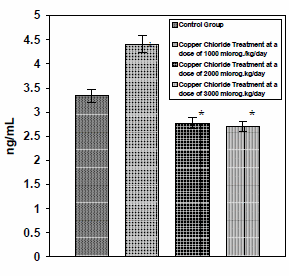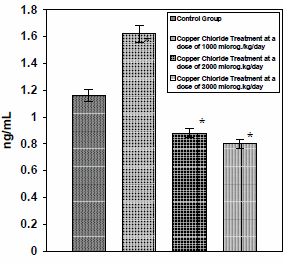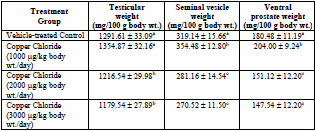|
Definition: "An ergogenic aid is any substance or phenomenon that enhances performance "
|
|
||||||||
23.07.2009 |
|
|
Animal study: copper chloride is testosterone booster
Men who are exposed during their work to toxic levels of copper often experience a decline in sperm production. This is confirmed by laboratory experiments in which high concentrations of copper given to rats led to a reduction in fertility. However, test tube studies have shown that copper leads to an increase in LHRH production by the hypothalamus. LHRH is the hormone that triggers the pituitary to produce the messenger hormones LH and FSH. These two hormones in turn trigger the Leydig cells in the testes to produce testosterone. So which way does it cut? Is copper good or bad for fertility?
To find out, the researchers injected young rats with a copper chloride solution directly into the rats' intestines for 26 days in a row. One group got nothing, the three other groups were given 1000, 2000 or 3000 micrograms of copper per kilogram bodyweight daily.
The 1000 microgram/kg/day increased the testosterone level; the higher doses led to a reduction in the testosterone level.

In the testes, the testosterone-stimulating dose of 1000 micrograms increased the activity of 17-beta-hydroxysteroid-dehydrogenase. This enzyme attaches hydroxyl groups to the seventeenth carbon atom of androgens, and it is driven by LH. And lo and behold: the 1000 microgram dose of copper chloride also led to an increase in the concentration of this hormone. Higher concentrations also lowered the concentration of LH.
Copper did not have a positive effect on FSH.
The researchers suspect that optimal dose for testosterone [1000 microgram/kg/day] increases the production of LHRH. This quantity improved the sperm quality of the rats, whereas higher doses led to a deterioration. The effect on the testosterone level was big enough to lead to a growth in size of the testes and the prostate.
The researchers did not examine cortisol levels. However, other animal studies have shown that high doses of copper inhibit production of corticosteroid hormone by the adrenals. This mechanism may also explain the effects of copper, the researchers think. Corticosteroid hormone inhibits the testes.
Source:
More:
|
|



